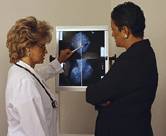
TUESDAY, Jan. 5 (HealthDay News) — Annual breast cancer screening should begin at age 40 for most women and start earlier — between 25 and 30 — for those at high risk for the disease, say new recommendations from the American College of Radiology (ACR) and the Society of Breast Imaging (SBI).
The new guidelines challenge controversial U.S. Preventive Task Force recommendations issued late last year that said women don’t need to start having mammograms to screen for breast cancer until they’re 50, and only need to be screened every other year.
The ACR and SBI paper also suggests appropriate use of medical imaging methods, such as mammography, MRI and ultrasound for breast cancer screening.
The document is published in the January issue of the Journal of the American College of Radiology.
“Evidence to support the recommendation for regular periodic screening mammography comes from the results of several randomized trials [RCTs] conducted in Europe and North America that included a total of nearly 500,000 women. Overall, based on a meta-analysis of the RCTs, there was a 26 percent reduction in mortality,” Dr. Carol H. Lee, chair of the ACR’s breast imaging commission and one of the authors of the new guidelines, said in a news release.
“It should be remembered that mammography is the only imaging modality that has been proven to decrease mortality from breast cancer. However, major efforts continue to build on this success by developing additional methods to screen for early breast cancer,” noted Lee, who is with the radiology department at Memorial Sloan-Kettering Cancer Center in New York City.
The nearly 30 percent decrease in breast cancer deaths since 1990 “is a major medical success and is due largely to earlier detection of breast cancer through mammography screening,” she said. “For women with the highest risk of developing breast cancer, screening technologies in addition to mammography have been adopted.”
The American College of Radiology was among the harshest critics of the Preventive Services Task Force recommendations when they were released in November. The ACR called those guidelines “a step backward” and said they “represent a significant harm to women’s health.”
More information
The U.S. National Cancer Institute has more about breast cancer screening.

